
Seasonal Sales Strategy: Make the Most of Spring
Spring is a strategic time to boost your business. Discover how to align your sales efforts with seasonal cycles and turn the transition into a growth driver.
By Nadia Bulcourt – 07/03/2024
Finding the perfect balance between expansion and efficiency in the sales department can be a challenge. This article explores innovative strategies for growing your team without compromising productivity. Discover how to attract talent, implement efficient processes, and optimize your organizational structure for harmonious, sustainable growth.
In the complex, dynamic fabric of business, the sales department plays a central, strategic role. It is the engine of growth, the pillar on which the relationship between the company and its customers rests. But what exactly are the main missions of this department?
First and foremost, the sales department is responsible for driving sales, actively seeking out new opportunities and maintaining fruitful relationships with existing customers. It’s a driving force that not only meets customers’ needs, but also anticipates their desires and expectations, turning them into loyal brand ambassadors.
The link between sales and company growth is undeniable. Indeed, a high-performance sales team can propel a company to new heights by generating additional revenues and conquering new markets. Customer acquisition and retention strategies, carefully devised and executed by members of the sales department, are essential to maintaining this growth momentum.
However, in an ever-changing sales landscape, trends and technologies are also shaping the way companies approach their sales activities.
The integration of sophisticated CRM systems, for example, enables sales teams to better understand individual customer needs, optimize sales processes and strengthen long-term relationships. Similarly, the impact of technological innovations such as artificial intelligence and automation is transforming the way sales are made and managed.
In this article, we explore in detail with Elisabeth Beauregard and Jean-Charles Spanelis, CEO of Finelis how to increase staffing levels in the sales department without compromising efficiency.
When I read what you’re proposing as a theme, having more people in the sales department equals a loss of efficiency, I confess that it escapes me a little. I don’t see how increasing the number of people means losing efficiency.
In the sector I’m familiar with, which tends to be initially financial technologies but also traditional software, sales are a little complex. In fact, in my experience, as soon as you increase the number of sales reps, you naturally increase the number of interactions between these salespersons, their hierarchy and the various IT, support and existing customer management departments.
But we often lose a little visibility for the rest. Indeed, there’s not much time left to go out and sign contracts, to really focus on the commercial aspect. So how do you keep an overview of all this, while at the same time maintaining a high level of interaction and movement within the company?
Of course, the more people there are, the more information needs to be passed on and processed. But for me, it’s more a question of organization, process, and management. So, there can be a loss of efficiency, especially at the beginning. It takes time for things to get structured. And you can’t immediately double sales with two salespeople.
So, there’s a time to adapt, and a time to improve. But then, logically, there are also additional sales. So maybe a bit of efficiency is lost. What’s more, the sales manager’s job is changing. He’s not responsible for one person in the same way as he is for two, three or four. So, he certainly needs training in team management and leadership.
In relation to your business, when you build up your sales team, in-house, there’s the question of how do I keep the salespeople? And then there’s the possibility of using the kind of services you offer, i.e., outsourcing. So, there are pros and cons. But in any case, for me, in these two examples, there’s still a need to organize, structure and transmit information. Otherwise, I don’t see how it can work, in either case.
So, what do you recommend in this respect? You were talking about temporality. How long can a manager or director wait to recruit one or more people? What’s reasonable? Because very often, I’m a bit worried when I have discussions with prospects or partners who tell me: “We’re going to test a collaboration over three or six months”. That’s much too fast. What do you think ?
I’d say it depends on what the manager or your customer puts in the bridal basket !
Outsourcing the management of your sales force offers considerable advantages in terms of time and resource management. Indeed, building and supervising a sales and marketing team requires particular attention during the recruitment process. This crucial step requires a clear vision of the company’s objectives, as well as the essential skills sought.
What’s more, once the sales team has been formed, it requires regular follow-up, both on products and sales techniques. This energy-intensive management can be lightened by outsourcing your sales force, thus preserving precious company resources.
By outsourcing its sales force, an organization refocuses on its area of expertise. This approach enables it to optimize the use of its resources by concentrating them where its skills are most distinctive.
Hiring a company specialized in sales and marketing activities is a wise strategic decision when it comes to outsourcing these services. Converting a database of prospects into loyal customers requires specific know-how. Sales teams from companies specializing in sales force outsourcing benefit from ongoing training and are evaluated according to their performance in the field.
As a result, the sales department remains the essential pillar of any organization seeking to thrive in a competitive market. From the effective management of sales teams to the judicious integration of new technologies, every aspect of this department is crucial to stimulating growth and ensuring the company’s longevity.
To ensure your company’s optimal performance, consider calling on experts like Finelis Coaching. With our proven know-how in coaching and sales outsourcing, we can help you strengthen your team, develop winning strategies, and take full advantage of market opportunities.
Don’t wait any longer to give your sales department a boost. Contact us today to find out how we can help you succeed.

Spring is a strategic time to boost your business. Discover how to align your sales efforts with seasonal cycles and turn the transition into a growth driver.

Attending a trade show is a powerful business opportunity. Discover how to maximize your impact with strong preparation, engaging techniques, and structured follow-ups.

Expanding internationally means adapting your company’s DNA without losing its essence. Learn how to structure your offer, refine your message, and build strong partnerships for success.

Are corporate values truly a performance driver, or just a marketing argument? When aligned with a coherent sales strategy, they become a powerful lever for growth and customer loyalty. Discover how to structure an effective approach to bring meaning to your values and turn them into a real asset.

Discover how to reinvent your sales strategies after Covid with a hybrid approach that blends tradition and digitalization. Learn how to outsource effectively, adopt a customer-centric approach, and develop essential sales skills to maximize your performance.
Innovation is a key lever for turning challenges into opportunities. With logistics solutions like KWiiD and Hipli, your business can reduce costs, enhance environmental commitment, and maximize commercial performance.